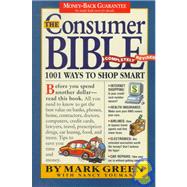
Note: Supplemental materials are not guaranteed with Rental or Used book purchases.
Purchase Benefits
What is included with this book?
| Introduction: Smarter Shopping in the New Consumer Century.. | |
| FOOD Groceries Fast-Food Outlets Water | |
| Health | |
| Health Insurance Pharmaceuticals and Pharmacists Doctors and Hospitals | |
| Long -Term care Nutritional Supplements Weight-Loss Products and Programs Health Clubs | |
| Infertility Services Eyeglasses and Contact Lenses | |
| Home | |
| Houses, Condos, and Co-ops Home | |
| Improvement Contractors The Energy Efficient Home | |
| Home Security Systems Furniture and Mattresses | |
| Pets Lawn and Garden Care Moving Companies Product Safety | |
| Technology | |
| Computers The Internet Cable Television Electronic Goods and Appliances Telephones Calling Long Distances | |
| Automobiles | |
| New Cars Used Cars Car Leasing Gasoline Automobile Insurance Car Repair | |
| Finances | |
| Credit Cards Banking on Banks Mutual Funds Retirement | |
| Nest Eggs Mortgages and Home Equity Borrowing | |
| Life Insurance Homeowners Insurance Debt Collectors Tax Preparers | |
| What You Wear | |
| Jewelry and Watches Cosmetics Dry Cleaning | |
| Children | |
| Child Care Toys | |
| Travel and Vacation | |
| Airlines and Airfares Travel Car Rentals | |
| Professional Services | |
| Lawyers Funerals Employment Agencies | |
| Shopping | |
| Outlet Shopping Home Shopping Installment Loans | |
| Layaway and Rent-to-Own Counterfeit and Gray Market Goods | |
| Consumer Privacy Environmental Claims | |
| Bias in the Marketplace | |
| Women Selling Minorities Short in the Marketplace Seniors as Consumers | |
| Consumers with Disabilities | |
| Last Resort | |
| How to Complain | |
| Appendices State Consumer Offices | |
| Sources Index | |
| Table of Contents provided by Publisher. All Rights Reserved. |
The New copy of this book will include any supplemental materials advertised. Please check the title of the book to determine if it should include any access cards, study guides, lab manuals, CDs, etc.
The Used, Rental and eBook copies of this book are not guaranteed to include any supplemental materials. Typically, only the book itself is included. This is true even if the title states it includes any access cards, study guides, lab manuals, CDs, etc.
Excerpted from The Consumer Bible: 1001 Ways to Shop Smart - Completely Revised by Mark Green, Nancy Youman
All rights reserved by the original copyright owners. Excerpts are provided for display purposes only and may not be reproduced, reprinted or distributed without the written permission of the publisher.